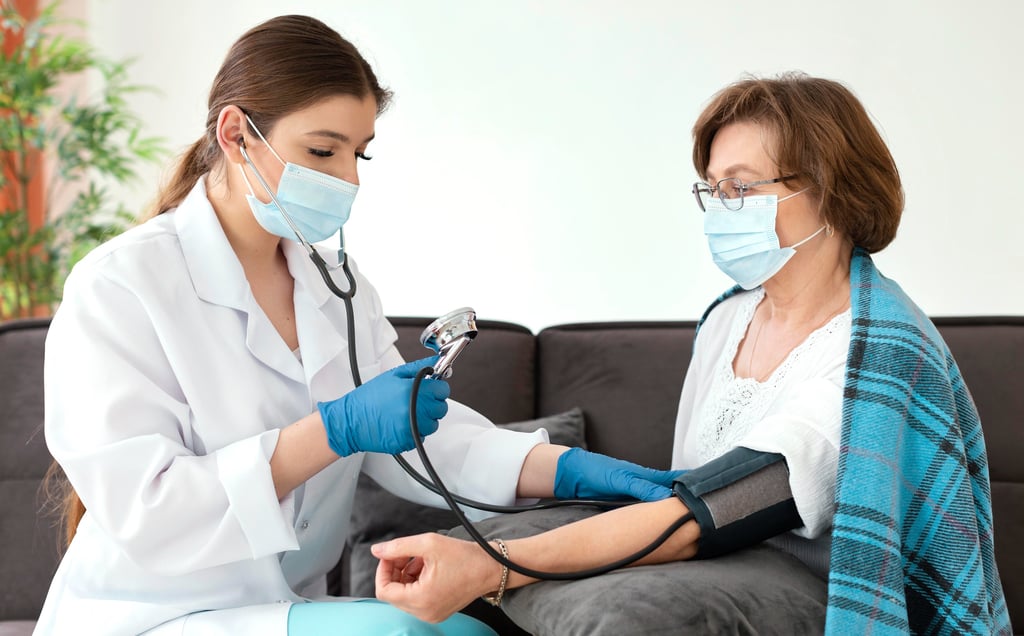Routine Health Checkups: The key to proper self-health inspection
The Importance of Routine Health Checkups for Home Healthcare Patients


For many who require long-term medical care, receiving that care in the comfort of their own home is ideal. Home healthcare allows patients to avoid a hospital or facility setting while still getting quality treatment. However, it's important that homebound patients don't neglect their health simply because they aren't in a clinical setting each day. Routine checkups performed by home health professionals play a vital role in monitoring patients' wellbeing and catching any potential issues early.
As convenient as home healthcare is, it's easy for patients to put off appointments or dismiss minor symptoms when they aren't in a medical environment regularly. Caregivers may also miss subtle changes in a patient's condition if they aren't thoroughly assessed periodically. Routine checkups help home health teams stay on top of patients' overall health status so they can quickly address any new or worsening problems. During these visits, professionals perform a variety of assessments and tests tailored to each individual's needs and conditions.
Vital Signs and Physical Exams
Taking basic vital signs is always a part of routine checkups. Home health nurses carefully monitor patients' temperature, blood pressure, pulse, respiration rate, and oxygen saturation levels. Significant changes in any of these readings could indicate the development of an infection, heart or lung issues, or other medical problems. Beyond vital signs, thorough physical exams are also conducted during visits.
Nurses perform head-to-toe assessments, carefully inspecting each body system for any abnormalities. They check for signs of swelling, rashes, wounds, or other changes in appearance. Sensory functions like vision, hearing, and response to touch are tested. Range of motion is evaluated for joints and limbs. Caregivers make notes of any new or worsening symptoms patients report so their provider can further investigate any concerns.
Lab Tests and Screenings
Depending on their conditions and risk factors, some home health patients may need to have routine lab work or screenings done during checkups as well. For example, those with diabetes will have their A1C and blood glucose monitored regularly. Patients on certain medications may need periodic kidney or liver function blood tests. Screenings like mammograms, colonoscopies, or bone density scans are also arranged through home health when due.
Catching potential issues early through routine testing and preventative screenings is key for homebound patients. It allows any health changes to be addressed promptly before they worsen or require hospitalization. Caregivers work closely with patients' physicians to determine which tests or screenings should be part of their regular checkup protocol based on individual needs and risk factors.
Medication Management
Managing medications properly is another important aspect of routine home health checkups. Nurses use visits to double check that patients are taking all prescribed drugs correctly and as directed. They look for signs of any adverse reactions or side effects from medications. Patients are also evaluated for how well different drug regimens are controlling their conditions.
If a patient is struggling with a medication schedule or seems to not be improving as expected on their current drugs, the nurse discusses these issues with their provider. Changes to the treatment plan like adjusting dosages or trying alternative medications are considered if needed. Staying on top of medication management through regular checkups helps homebound patients get the best possible outcomes from their drug therapies.
Caregiver Assessments and Education
Beyond assessing the patient's health, routine home visits also allow nurses to evaluate how caregivers are coping and handling demands. Caregiving can take both an emotional and physical toll. Nurses make sure to check in on caregivers' wellbeing as well during checkups. They look for signs of burnout, stress, or physical strain.
Caregivers are also provided with education during routine visits. Nurses reinforce proper techniques and safety measures for tasks like lifting, bathing, or wound care. They address any questions about patients' conditions or treatment plans. Caregivers are also encouraged to voice any challenges they are facing so additional support services can be arranged if needed. Ensuring caregivers have the knowledge and resources to care for patients properly is just as important as the patient's health assessments.
Coordinating with Other Providers
Routine home health checkups also serve as an opportunity for nurses to coordinate care with patients' other medical providers like physical therapists, social workers, or physicians. They provide updates on how treatment plans are progressing and discuss any new issues or concerns that have come up. This helps ensure seamless communication between all members of patients' care teams.
If a patient recently had a hospitalization or emergency room visit, the nurse will obtain records from that encounter during their next routine checkup. They integrate any changes to the treatment plan or new diagnoses into the home care. Regular communication helps avoid gaps in care coordination that could put patients' health at risk.
Catching Problems Early Saves on Healthcare Costs
While routine home health checkups may seem like an added expense, they actually help reduce healthcare costs in the long run. By catching potential issues early through regular assessments and monitoring, many serious illnesses or hospitalizations can be prevented. Minor problems don't get a chance to escalate when home health teams are proactively managing patients' conditions on a scheduled basis.
The cost of treating an advanced or complicated medical problem in an emergency setting far outweighs the price of routine preventative care in the home. Homebound patients who forego regular checkups are also more likely to experience crises that require ambulance transport or emergency room visits. Proper management through consistent home health monitoring helps patients stay healthier in their own homes for longer.
In conclusion, routine health checkups performed by home health professionals play a vital role in comprehensive care for patients receiving long-term medical treatment at home. Regular monitoring, testing, medication management and care coordination catches any potential problems early before they worsen. It also helps reduce healthcare costs long-term by preventing serious illnesses or hospitalizations. With proactive, preventative care, homebound patients can maintain optimal wellness and independence for as long as possible.
